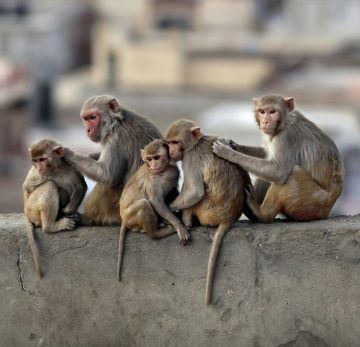Elizabeth Svoboda in Undark:
 On the Puerto Rican island of Cayo Santiago, it’s the monkeys, not the humans, who are in charge. Yet this palm-fringed haven — home to about 1,000 rhesus macaques—can feel strangely similar to a weekend watering hole or middle-school cafeteria. Among these gregarious macaques, cliques, best-friend pairs, and social climbers are all much in evidence, giving scientists a close look at the primate origins of our drive to affiliate.
On the Puerto Rican island of Cayo Santiago, it’s the monkeys, not the humans, who are in charge. Yet this palm-fringed haven — home to about 1,000 rhesus macaques—can feel strangely similar to a weekend watering hole or middle-school cafeteria. Among these gregarious macaques, cliques, best-friend pairs, and social climbers are all much in evidence, giving scientists a close look at the primate origins of our drive to affiliate.
As science journalist Lydia Denworth visited places like Cayo, she grew convinced that humans’ social connectedness was far more deep-rooted, and far more biological, than experts had long assumed. For centuries, Denworth notes in “Friendship: The Evolution, Biology, and Extraordinary Power of Life’s Fundamental Bond,” our desire to make friends “was considered purely cultural, an invention of human society — and modern human society at that.”
But Denworth marshals new evidence that in friendship, as in so many areas, we’re not all that different from our primate forebears. Friendship isn’t just “the leavening in our lives”; it evolved because it has a direct bearing on our mental and physical health. Among the Cayo macaques, biologist Lauren Brent reports, those with the strongest social networks have lower levels of stress hormones — a factor known to buffer against disease.
More here.
